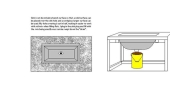posted 11 years ago
Sherry,
It doesn't make any sense at all to heat water with solar electricity. It will take much smaller collector area to heat water with the sun's light and heat directly, than to turn the sun's radiation into electricity and then turn that electricity into heat. Actually not a "much" smaller collector area, but a MUUUUCCCCHHH smaller collector area.
You are confusing some extremely different levels of power usage. You can run your phone, laptops, and LED lights 24 hours a day without turning them off, and it will still use only a fraction of a 15 minute electric-heated shower.
LED light bulb (equivalent light to about 60W incandescent in my experience): 2W. So 4W over your desk or 10W for a whole room.
Charging a laptop: 25 to 60W
Charging a phone: 5 to 10W
Any appliance that creates heat, such as a toaster, hair dryer, or water heater: minimum 1000W, more likely over 2000W, or you originally mentioned an instant model at 12,000W(!)
That one water heater draws as much power as 6000 LED bulbs or 200 big fat laptops.
When you design for off-grid living, the first thing you do is find all the ways you need to generate heat, and make sure that you are not doing them by electricity, but by any other means. Then you can size your PV system small, and still use your phones, computers and lights to your heart's content. For hot water, install a solar water heating system that uses the sun's light and heat directly. Much cheaper, and much smaller solar collector area.
Same with heating water with a generator in the winter. You'd burn less fuel if you simply used a fuel-burning water heater of any type. Why convert chemical energy > heat > electricity > heat instead of converting chemical energy > heat directly?
Every time you convert energy from one form to another, some energy is lost; or conversely we speak of the efficiency of the process. If you want heat from the sun, use it directly instead of turning it into electricity and then back into heat.
I say this not only from facts and numbers, but this is the system I live on. We've got 50 teenagers living in a sprawling campus: we leave the corridor and outside lights on all night, the kids often leave their lights on all day by mistake or habit, a dozen mobile phones, a computer classroom with small laptops, a decent sized flat TV. When the sun is shining and the batteries are charged, we use a blender, laser printer, clothes washer or power tools. We do all this with under 4kW of solar panels because our house heating, water heating and cooking are all done with other sources of heat. Our PV panels could supply one third of your 12kW instant water heater, at noon on the best sunny day.
Another way of putting it: 150 of us using LED lights, laptops and phones with abandon = your 12 kW water heater.
Meanwhile, a solar water heater with a solar collector area equal to about 1kW of PV will give you enough hot water for a small family to wash dishes freely and take judicious showers as you plan to do. Of course it will have an insulated storage tank so you canhave hot showers in the early morning.
Works at a residential alternative high school in the Himalayas SECMOL.org . "Back home" is Cape Cod, E Coast USA.













 1
1










 1
1




 1
1


































